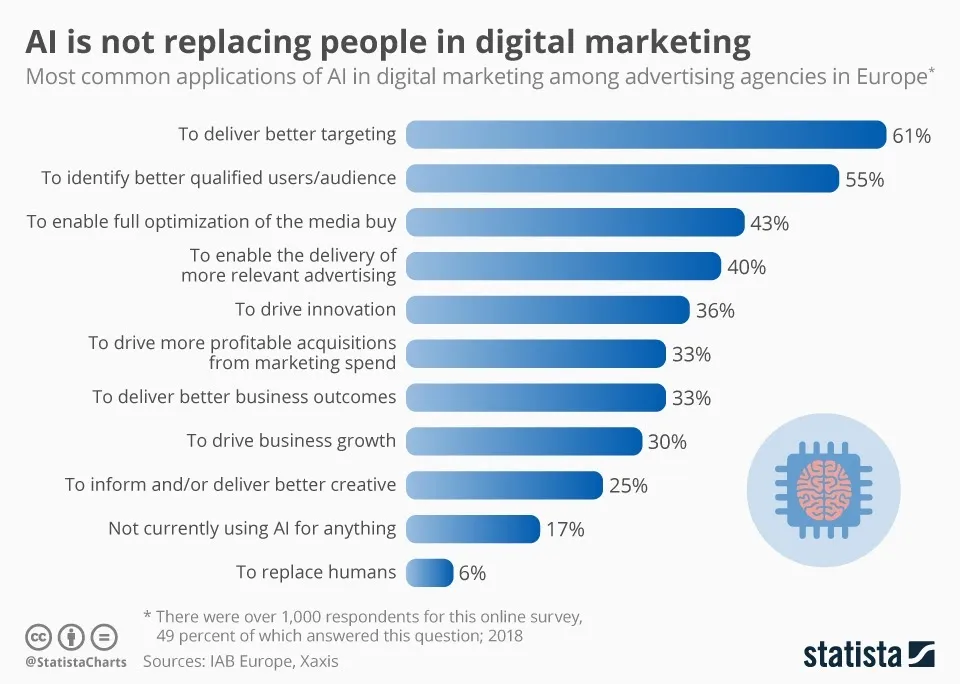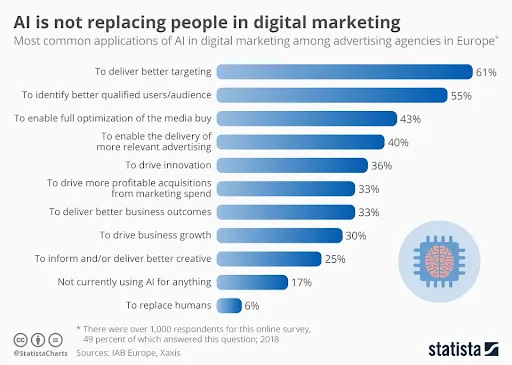In this article, you’ll learn:
We all know the value that marketing lends to a brand. It’s the very thing that gets your product or service noticed. Unsurprisingly, we are seeing marketing adopt digital content marketing more and more. The rest of the world has gone digital, and marketing needs to keep up.
Over the last two years, our lives have become even more digital than before. From virtual meetings to cloud storage, it seems that we are delegating more and more work to machines and automatic workflows. Business professionals all over the world are already using solutions such as SEO Optimization, Digital Asset Management, and Workflow Automation to their benefit. The next big step in this journey of workspace optimization is Artificial Intelligence (AI) enhanced software. Harnessing the power of AI will allow all industries to become more efficient and elegant in their work, and content marketing is no exception.
Today, we will explore five ways that AI is going to revolutionize content marketing and change it like nothing else.
How is AI Getting Involved?
Already today, industries all over utilize AI to optimize their work. The demand for qualified data analytics professionals is growing. From border security and CCTV’s usage of facial recognition and ID verification to Netflix’s recommendation algorithms, machines help humans process information with speed and quantity that the latter cannot compete with.
So, what does it mean for content marketing? Are machines gonna start writing articles for you and quick copywriters out of business? Worry not. A survey by Statista asserts that the most common usages for AI in marketing are:
- To deliver better targeting
- To identify better qualified users/audience
- To enable full optimization of the media buy
“To replace humans” is proudly sitting at the bottom of the use cases, with only 6%

So, no. AI is not here to replace humans. It is here to lend a helping hand and to keep an eye on various data such as SEO return on investment (ROI) so that you don’t have to.
With that said, let’s look at how can we put AI into practice.
1. AI Can Be the Ideas Man (or Machine)
We can integrate AI into almost every stage of the content marketing process, including brainstorming ideas.
Using SEO competitor analysis, AI can discern what your rivals are doing and the efficacy of their content marketing strategy. That, in turn, allows you to fine-tune your strategy. For instance, you may find out that your competitors get a lot of traction on posts about topical trends on social media, so you might consider exploring that avenue. Alternatively, posts that get too preachy or political might be getting lukewarm reception so they need to be avoided.
Not by competitors alone, however. AI also has an ability to analyze your stats - topics that you cover, and posts that get the best responses and reaction - and engage in predictive analysis to give you hints on what to write next.
2. AI Can Pass Judgement
AI can monitor your campaigns and provide the ultimate judgment: was it a success?
By breaking down the performance into data feedback, AI can quantify the successes and pitfalls of your current content marketing strategy. A robot cannot put a number on the quality or literary beauty of your articles but it sure can do it with your content’s metrics - engagement, time spent on a page, etc. Software testing methods are a good analogy, as its main paradigm is about collecting data from several sets and comparing them against chosen metrics. Likewise with content marketing.
For the best effect, you need to produce content that varies both in length and topics. That way, AI can evaluate the successes and failures of each approach and generate more refined data analysis. It can even monitor your website for duplications and resolve duplicate content SEO concerns.
3. AI Can Create a Content Profile
Creating a content profile is a long and laborious process of analyzing all posts and compiling them to showcase which arrears need improvement and rework. Even for small businesses, it would take a lot of effort to do that manually. Not to mention manual content profiling would introduce human biases (as people who write content would also be the ones doing the reviews, most of the time) that can make the resulting data less valuable. AI has neither speed concerns nor ego so it can easily and quickly access all the content that you have with impunity.
Creating a content profile is a valuable task, considering the high impact of digital marketing for small businesses. After all, blogs are the tool when we are talking about content marketing. The only catch is that content has to be well-written and optimized to meet the expectations of the users. When done right, blogs can increase % of indexed pages by 434, and indexed links by 97.
4. AI Can Understand Your Customers
If all content can be quantified into data streams so can be the customers’ experiences. Every user has a digital footprint: what they are looking for, their actions on the page (time spent, clicks heatmap, etc.), that can be analyzed to figuratively tap into people’s minds. For many years, it’s been marketers’ dream to see what prospects think, and AI just might turn this dream into a reality.
The biggest strength here is, once again, the machine’s lack of bias and prejudgement so it can perceive and interpret things in ways that produce great results but that might not be as obvious to human minds. A while ago, HubSpot published a case study about how businesses turned canceled B2B events into sales opportunities. It was a stroke of genius and AI can dish out these unorthodox solutions as easy as cutting cake.
Furthermore, more and more we see demand for custom, individualized content. Per Gartner’s survey, the challenge of content customization has been on the rise over the last 2 years:

If this trend persists, we can expect these challenges to become even more prominent than they are now.
The biggest roadblock on this path is the inability to efficiently assess the demands of every individual. People’s tastes are mercurial after all and by the time you manually prepare a content or feature pipeline for every prospect they might move on to the next thing. That’s where AI steps in (once again) and its contribution to conquering this conundrum is two-fold.
Referring to Statista once again, a survey from 2019 established that 45% of millennials in the United States use voice assistants while online shopping. Here, AI-empowered analysis first can establish this pattern of behavior. Then, speech-recognition algorithms can enable you to produce a voice assistant that will be pleasant and convenient to use, thus meeting the expectations and demands of the customer.
Without data gained through AI analysis, it is challenging to deduce these patterns and your content marketing strategy would struggle behind that of competitors.
5. AI Can Help with Creating and Managing Posts
AI can analyze the best moments to create and promote your content, ensuring that your content marketing maintains its peak momentum. It can also maintain the articles themselves in a tip-top shape. Some of the more popular spell-checkers on the market (like Grammarly) have gone beyond pointing out when you’ve spelled copmuter instead of computer. AI-enhanced spell checkers can check your writing for correct tone, voice, and also point out semantical and stylistic mistakes that are harder to catch than some simple spelling errors.
The most recent tech developments promise an ability for machines to write (!) content. Natural Language Generation (NLG) converts computerized data into written narratives. It can write simple blog posts and articles in a natural and human way, enabling a high production of content with minimal exertion. It can even integrate link building into the content, and use the optimization methods that it promotes. That said, with search engines and publishers cracking down on low-quality AI content, it's wise to check any AI-generated draft in any good AI detector before publishing to ensure your content maintains the authenticity and originality.
Given that in 2019, bloggers spent 65% more time writing posts (with an average post talking just under four hours to write), we can see the value that AI integration can bring into this area. Professionals often turn to educational hubs like Coursiv to learn how to reclaim those hours by effectively implementing these AI solutions. With AI, you can delegate AI writing simple social media posts and newsletters to machinery, while your writers are going to spend less time working on large texts thanks to AI-enhanced grammar and style checkers.
6. AI in Digital Asset Management
We’ve spent a lot of time talking about text in this article but everyone knows that the modern content isn’t just about clever words and Pulitzer-winning passages. It’s all in the looks, and there are scientific and tech reasons for this traction towards bigger visual flair.One of the biggest game-changers in this space is AI ads, which leverage machine learning to create highly engaging visuals tailored to specific audiences. These ads optimize everything from colors to layouts, ensuring maximum impact with minimal effort.
First, we have to consider that humans process visual information faster than text (60,000 times faster to be precise). A picture is worth a thousand words and all of that. Second, the Internet is not the same as it was even a decade ago. With virtually everyone having access to unlimited high-speed Internet from the palm of their hand, worrying about eating people’s data with pictures and videos is a thing of the past.
So, how does AI help here? There are a few ways, as always. You can use AI to generate marketing assets, be it logos, packaging, or whatever else. In 2017, Ferrero Rocher flaunted its AI tech to the world, using it as a marketing opportunity. Using AI, they’ve created 7 million different jars of Nutella, each with a unique design. Not only did it save Nutella some time but it also made customers want to get a jar almost as a collector’s item because they knew that their jar will be the only one in the world.
Don’t discard your existing assets just yet, however. AI will be a great boon if you have hundreds of assets at your disposal, and you sometimes have challenges sorting through the entire collection to find a photo that fits just right. Doubly so if (as it oftentimes happens) you did not expect your asset collection to grow that fast and you haven’t set up proper organizational practices.
It isn’t a secret that Digital Asset Management (DAM), such as Pics.io helps you save time on management and retrieval of visual media so that you can spend more time doing cool things like brainstorming a new marketing campaign or organizing a rebellion against your new AI overlords.


Conclusion
We’ve delegated a lot of our tasks to computers decades ago, and AI isn’t something to fear. It is just another, important step in the evolution of our relationship with machinery. When it comes to content marketing, AI seeks to do what machines always did best: streamlining and optimizing mundane and monotonous tasks so that humans can focus on creative output. Be it content strategy optimization, asset retrieval, or editing your texts, AI is here to stay. So, why not step into the future today with Pics.io? You can try it for free and see for yourself just how much easier your life becomes when you don’t have to spend so much time hunting for your assets in the wilderness of disorganized cloud storage. Hope to see you there!
Curious? Learn more about Pics.io or book a demo with us and we'll answer all of your questions!



